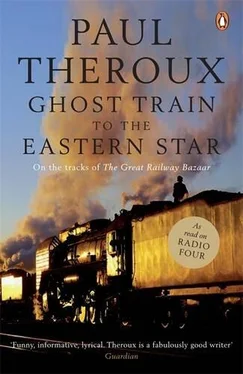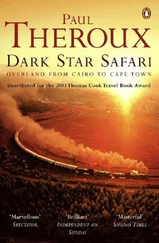Nor had the boxes of fluorescent tubes and coils of wire stacked on the tables been moved or tidied. They crowded the gunked-up sauce bottles.
At the sight of this filth and disorder, my spirits rose. It was easy to prettify a nation in an airport, but on this train traveling through the provinces of a hard-pressed country I felt I was seeing the real thing, a place with its pants down. I didn't take this personally. I was grateful that no one had gone to any trouble for me, that I was not getting red-carpet service.
The chef did not even look up from his backgammon board when he said, "Eat!"
Another, the man who had winked, said, "Sit! Sit! You want chicken?"
"No."
"Only chicken. Sit!"
He pushed some coils of wire to the far side of one of the tables — I was apparently the only diner — and then the lights went out. When the lights came on again there was a bowl of bread crusts in front of me, which seemed a neat trick.
" Salade? "
"No."
I was served a bowl of dill pickles. I thought: Who could invent this? Merely to live here was to experience satire.
Tipsy though he was, the conductor was able to form the words "You lock couchette?"
"How could I lock it?I don't have a key."
Without a word, in a kind of reflex of drunken panic, he ran out of the dining car. I followed him, and when he got to my compartment he motioned for me to check my bag. He gave me to understand, in gestures, that there were thieves on the train and that I must be very careful (wagging his finger, then touching it to the side of his nose).
The lights went out before we got back to the dining car, but came on again in time for me to see the man in the filthy sweater (and now I knew why it was greasy) standing over a frying pan, holding a cleaver, and sending up sparks and spatters. He could not remove the cigarette from his mouth, because he was holding the frying pan with one hand and smacking at a piece of meat with the other. His smeared glasses were slipping down his nose; he pushed them up with a deft nudge of his dripping cleaver.
He yelled at the others, one of whom relayed the message to me: " Gratin? "
"Okay."
Then the backgammon players began bantering with each other.
When the plate was put before me I marveled at the man serving me: his sticky glasses, his drooping cigarette, his dirty sweater and bandaged hand. The fried potatoes were coated with cheese. I picked at it, grateful for the reassurance that in this corner of the world nothing had changed in decades. And the next time someone praised the Hungarian economy or talked optimistically of Romania's imminent entry into the European Union, I could reflect on the revelation of this disgusting meal.
While the rest of the world was bent on innovation and modernization, looking for salvation on the Internet, things here were pretty much what they'd always been. Speaking of time warps, Hungary was about to elect another socialist government. For some reason, perhaps the sheer perversity that finds absurd logic still alive in the world, this pleased me. It reminded me of the time I'd spent in Vanuatu, in the western Pacific. One rainy day I saw some people on the island of Tanna standing and squatting, bollocky naked, wearing only penis sheaths and refusing to listen to some missionaries who had come across the ocean to convert them. These God-botherers had then trekked twenty miles down a muddy path to share their Good News Bibles. The people on Tanna sent them away, saying they had their own gods, thanks very much.
Stubborn seediness has great appeal, and this ramshackle railway had not changed in thirty-three years. It was, if anything, worse, almost a parody of my previous experience. The Hungarian border was farcical too, the customs-and-immigration people tramping through the carriage in wet boots and ill-fitting brown uniforms. The Romanian border at Curtici was even grimmer, as though another act in the same farce: big beefy-faced brutes with earflaps and gold braids, a dozen of them swarming over the train demanding passports, opening bags.
One of the customs men went through my books, the Simenons and some others, and selected Nabokov's Invitation to a Beheading. He squinted at it. Did he guess that this novel is about injustice in a nightmarish police state?
"Where you going?"
"Istanbul."
"What doing? You tourismus?"
"Me tourismus."
Turning the pages of my passport, he put his fingers on the visas. "Azerbaijan! Uzbekistan! Pakistan! India!"
"Tourismus."
He flipped his big fingers at me. "Heroin? Cocaine?"
I laughed, I tried to stop laughing, I laughed some more, and I think this idiotic laugh convinced him of my innocence. His comrade joined him, and together they searched my briefcase. I stood to one side, and when they were done they welcomed me to Romania.
Their baggage fondling was no worse than the TSA's at any American airport. In fact, it was a lot simpler and less invasive.
Just behind these customs men was an attractive woman wearing an ankle-length leather coat and high shiny boots, another figure from the past, a suitable introduction to Transylvania, where we were headed, and like a character in the Nabokov novel, which could have happened in a place like Bucharest.
***
THE RAIN WAS STILL FALLING AS, with howling brakes, the train came to a dead stop at Baneasa Station in the center of Bucharest, where I was to change trains — the next one, for Istanbul, leaving later in the day. The rain spattered on the oily locomotive and the platform roof and the muddy tracks. But this was not life-giving rain, nourishing roots and encouraging growth. It was something like a blight. It spat from the dreary sky, smearing everything it hit, rusting the metal joints of the roof, weakening the station, fouling the tracks. It lent no romance to the decaying houses of the city; it made them look frailer, emphasized the cracks in the stucco, turned the window dust to mud. There was something so poisonous in its greenish color, it seemed to me like acid rain.
Pale, pop-eyed Romanians had a touch of Asia in their dark eyes and hungry faces, and almost the first people I saw were two urchins, very skinny boys not more than ten, in rags, looking ill, both smoking cigarettes and pretending to be tough. They had tiny doll-like heads and dirty hands. They fooled among themselves and puffed away, and when they saw me they said something, obviously rude, and laughed.
Only pale, underfed faces — now and then one of a girl that was porcelain-pretty; skinny girls, fat women, tough-looking men, most people smoking foul cigarettes — no foreign faces, none that I could see at the station. Why would anyone come here? Romania was a world few people visited for pleasure, and that was evident in its abandoned look, its wrecked buildings, its mournful people. It seemed lifeless, just hanging on. A great melancholy in the houses with cracked windows, the broken streets, the bakery shops where every pastry looked stale.
I went to make sure that the train to Istanbul, the Bosfor Express, would be leaving on time. A young man standing near the information booth said he hoped it would — he was taking it.
"I'm going to a conference in Turkey," he said. He was an academic, named Nikolai, teaching at a university in Bucharest.
He showed me where the Left Luggage window was — he was leaving bags there too. On the way, I mentioned that I hadn't seen any foreigners — none of the Asians or Africans or South Americans I'd noticed from London to Hungary.
"Some Americans come here. We have bases."
I might have known. Romania was in the news as America's friend in the war on terrorism. Its right-wing government, desperate for money, eager to join the European Union, had approved the imprisoning and interrogation of suspects. The process, called extraordinary rendition, meant that a man like the one described in the New York Times in July 2006 from Algeria, who was picked up by American agents in Tanzania, would be blindfolded and sent to a third country to be questioned — and questioning always involved some sort of torture, ranging from sleep deprivation, to the suffocation and simulated drowning called waterboarding, to being hanged by the wrists against the wall of a cell, all these methods going under the Orwellian euphemism "enhanced interrogation techniques." I never heard that expression without thinking of a prisoner being kicked in the balls.
Читать дальше












